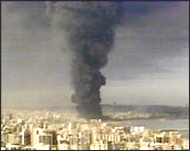Lebanese fear more outages
The lights have flickered back on in Lebanon after power cuts plunged the country into four days of darkness.

But many fear a winter by candlelight as the power utility struggles to cover the higher cost of fuel.
Lebanese Energy Minister Ayub Humayyid has said electricity would gradually return to normal as ships unload fuel – but those supplies will last only until the end of the month.
It was not clear how long state-owned Electricite du Liban (EDL) would be able to keep the lights on given its insufficient fuel reserves and lack of money to pay for more fuel.
“The reason for the blackouts is rising fuel prices,” an EDL official said. “EDL has fallen into a financial crisis where its budget cannot cover the cost of fuel. Today, oil prices are $51 a barrel. Our budget was drawn up on the basis of $25 a barrel.”
War costs
Local media showed images of cities swathed in darkness and blamed political squabbles for the electricity “scandal”.
 |
|
Repairing the country’s grid after |
“We’ve been sitting in by candlelight with nothing to do. We can’t watch TV, can’t read,” Muna Haidar, a teacher, said. “It’s worse than the war. Then we expected cuts. We had gas lamps and batteries. This time no one was ready.”
Lebanon spent billions of dollars repairing its power grid after the 1975-1990 civil war, when most Lebanese plugged into a local generator for a fee or powered lights with car batteries.
Political bickering within the government has since stalled the privatisation of EDL, which loses some $500 million a year to waste, overstaffing and failure to collect all of its bills.
No warning
Minister Humayyid said the government needed to extend credit to EDL for more oil. But the finance ministry, which is trying to cut spending, has been reluctant to raise subsidies for EDL.
The latest cuts came with no warning or rationing schedule.
They left Beirut in darkness for up to 20 hours a day, causing a public outcry as restaurants turned away customers and shops threw out melted ice-cream and sour milk.
Adil Aziz Ajaj, who owns a dairy in north Lebanon, said the products shops were returning spoiled had gone up five-fold.
“It’s disastrous if it stays like this,” he said. The Lebanese fear they will end up breaking their daily dawn-until-dusk fast during the Muslim holy month of Ramadan, which begins in about a week, by candlelight.
“No one believes this is a fuel crisis,” said Nazha Miribi, a 36-year-old graphic designer. “It is a political crisis.”